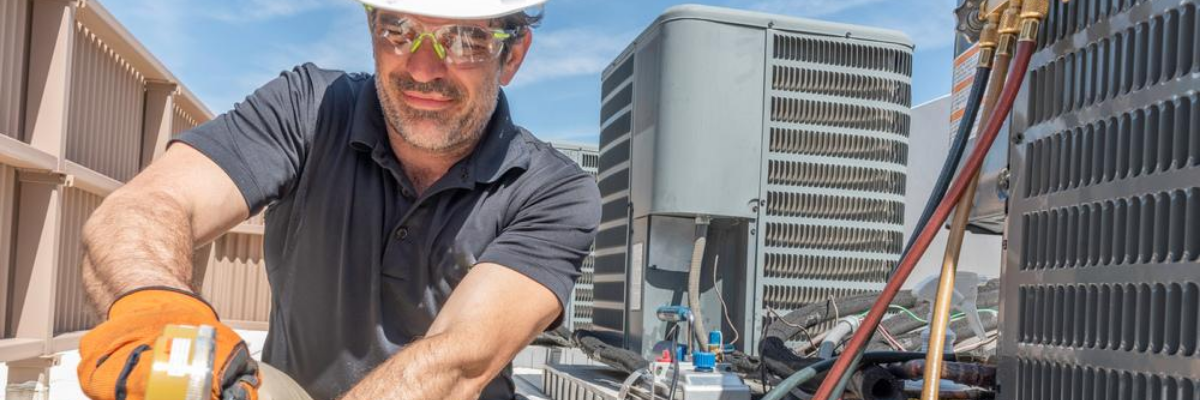Working as a service technician in HVAC and Refrigeration brings many rewards, including interesting and varied work, job security, and the ability to earn an excellent income and paid benefits.
However, there are safety risks associated with working on equipment with high voltage and chemical refrigerants. And now, due to coronavirus, there’s a potential health risk for technicians entering any building and working on equipment that may have come into contact with virus particles.
That’s why it’s so important for service technicians in the HVACR industry to be carefully trained on how to use personal protective equipment (PPE), and how to safely work around electricity and refrigerants.
For those thinking about joining the industry or just getting started, here’s what to expect.
Refrigeration and HVAC safety: PPE and equipment
Protecting yourself from injury means ALWAYS using the recommended Personal Protective Equipment (PPE) for the task you’re doing.
PPE for HVAC and Refrigeration technicians
Face shield or safety glasses protect your eyes and face from dangerous chemicals (especially refrigerants) as well as flying objects, dust, and debris.
Respirator with HEPA filter or N95 face mask protects you from inhaling dangerous chemicals such as refrigerant or carbon monoxide, and potentially from exposure to other contaminants such as coronavirus particles and mold. Learn more about respiratory protection.
Inner nitrile gloves help to prevent exposure to harmful substances, and outer work gloves protect your hands from injury.
Work boots protect your feet from injury when you’re working with sharp tools or heavy objects.
Hard hats may be required in some working conditions.
Equipment and tool safety
Accidents and injuries can happen because of the poor condition of tools and equipment, and also not having the proper tools for the job. For example, falls can happen due to a broken or unstable ladder. A damaged refrigerant gas cylinder can explode in extreme heat or if handled improperly.
And here’s another common problem: getting injured because you lacked the proper tool for the task at hand, and had to make do with using something else.
That’s why every new HVAC and Refrigeration technician should be taught to regularly check the condition of their tools and equipment. And if you don’t have a tool that you need to work safely, it’s worth the investment to protect yourself.
And, since the onset of the pandemic, keeping safe also means using proper protocols to clean and disinfect tools.
Learn more:
How to Clean and Disinfect Tools
Electrical safety
Maintaining and repairing HVAC and Refrigeration systems requires working around high voltage electrical currents. This is probably the most dangerous aspect of the work. It’s one reason why inexperienced technicians should always be supervised when working in the field.
Every technician should receive formal electrical safety training. Here are just a few critical tips:
Never wear conductive materials such as synthetic clothing or metal jewelry. And don’t forget to wear your work gloves.
Turn off the power to the HVAC system at the circuit breaker before working on equipment. This protects the equipment from damage as well as your personal safety.
Always follow lockout and tag procedures so no one can turn the power back on while you’re repairing equipment.
Use a properly-rated multimeter to test circuits for energization before working on them.
Don’t operate electrical equipment in wet conditions, and use a GFCI (and healthy caution) in damp settings.
Know the signs of electrical trouble, such as blown fuses, tripping circuit breakers, hot wires, connectors, and boxes, burning odors, flickering lights nearby, and buzzing sounds.
Always follow manufacturer instructions and wiring diagrams when installing equipment and making repairs.
Chemical and refrigerant safety
Exposure to chemicals is part of a service technician’s job. Refrigerants and solvents used for cleaning equipment components can be dangerous if they come into contact with skin or eyes, or if inhaled. It’s essential to know how to protect yourself and to establish good habits.
Remember that refrigerant is safe when properly contained in a cylinder or within the HVAC system. So the key is to conduct regular checks and follow processes to prevent leaks.
Always wear protective gear. The PPE described above protects your skin, your eyes, and your respiratory system from exposure to dangerous chemicals.
Know the rules for handling, storing, and transporting all dangerous substances. For example, before filling refrigerant cylinders, always check the operation of the valves and weigh the container. Don’t use pressurized gas cylinders that are rusted or dented. And store them upright and restrained with a chain or strap in cool, dry locations (not in a scorching hot truck). Always transport canisters with a hand truck or cart.
More safety best practices
Assess the work environment. When you arrive at a customer site, look around and pay attention to potential safety risks, such as slippery floors, extreme temperatures, fall risks (especially when working on a rooftop) and the possible presence of hazardous substances.
Work smart. Don’t allow yourself to lose focus due to fatigue or discomfort. Take appropriate breaks, especially in extreme heat. Stay hydrated. Dress appropriately for the weather. And pay attention to others working along with you.
Drive safely. As a field service technician, you’ll spend a fair amount of time behind the wheel. Accidents often happen when you’re in a rush. So try to leave enough time to get to your next destination, and stay in touch with dispatchers if you’re running late. Remember, your driving puts others at risk and also impacts the reputation of your employer.
More resources for starting your career in HVAC and Refrigeration
If you’re just getting started in the field, or thinking about a career in HVACR service, check out our career resources here.

